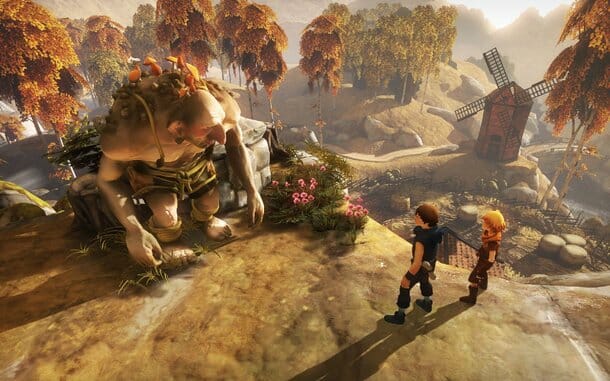Brothers: A Tale of Two Sons (Multi-Platform)

Playing Brothers: A Tale of Two Sons is the best way to simulate the role of the middle child.
From experience, the brother that arrives between first and last gets the pleasure and the burden of acting out both parts at once. To the older brother, he is a companion, a student; to the younger, a mentor and a close friend. Being in that position is to know two very different halves of one’s self, with an obligation to embody and appreciate both extremes.
Brothers takes this concept to a literal level, asking you to perform as an older/younger sibling pair in concert. It’s a cooperative experience, but one made distinct by being self-contained. Instead of inviting another party to play as one of two adventure-bound boys, it halves your available attention and doubles your input, pouring you evenly into the actions of each brother by mapping control of their respective movements to the analog sticks of a single controller.
Controlling two bodies at once in a game is a curious exercise. A single player directs them, but the common incoordination between hands often keeps the boys dashing off on opposed paths. Even from a perspective set high overhead, it takes patience to move the brothers in any kind of decent unison.
After some time, I found myself leading with the left stick, the one usually set as the default for movement, and following its trail closely with the right—which happened to result in the older brother setting the pace and direction, with the younger brother bounding at his heels.
Narratively, a blood relationship takes minimal effort to establish—you can just come out and say it. The trouble is in portraying kinship, the messier, long-term share of the sibling dynamic, without it smacking of triteness and cliché. Brothers does it by not saying much of anything at all.
What language is this? I found myself wondering aloud in the game’s early minutes. What are these two boys actually saying to each other?
The patter between them, like most aspects of Brothers, is intentionally vague. It’s less a voiced exchange than a shorthand of tones, calls and gestures. Instead of direction, the boys point and wave. In place of explanation, they sound their emotions in gasps and cries.
This pantomime, however limited, is not short on expressiveness, and sets an example followed by the game’s wider narrative. In the first 15 minutes, Brothers lays bare its characters’ histories and the motivations for their journey, then proceeds to tell a story backed by the philosophy that the most powerful truths are those shown or inferred, not belabored.
Aside from its use in negotiating obstacles, the outcome of a trigger press also changes with certain contexts, often to complement each sibling’s personality. Older brother can only clutch a villager’s cat awkwardly at arm’s length, but younger brother can hug and cradle it to a deep purring. Older brother will wash his face in the stream, but younger brother will still splash and yell. Where one will do a chore, the other will do a trick.
